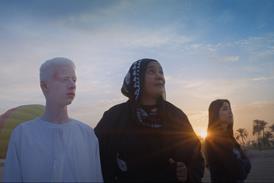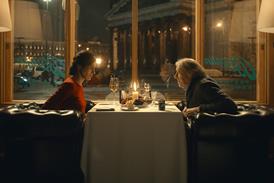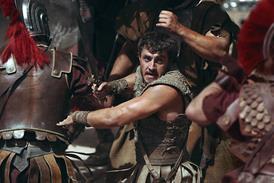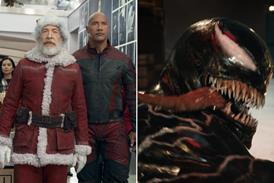Cannes Film Festival artistic director Thierry Fremaux announced the Official Selection for the 66th edition on Thursday (April 18). He talked to ScreenDaily afterwards about the selection, why he doesn’t think micro-budget filmmaking is the way forward and Lars von Trier.
Are there any titles that got away?
It’s more complicated than that. Three, even six months before Cannes a dream list starts to take shape but it’s just a wish list - there are always films which aren’t ready and others that simply aren’t good. We’re very happy with what we’ve got. The press loves to speculate on what’s in and what’s out and that’s fine – it’s a Cannes tradition.
Positive rumours are okay but then you get negative rumours suggesting that a film was rejected and very often it just wasn’t ready.
Conversely, there are lots of films we think won’t be ready and then are. We saw Nebraska, the day before yesterday (April 16). Alexander said to me, ‘You never know, it might be ready’. There was also some doubt over Claire Denis’ The Bastards. She couldn’t find the film in the editing process.
Lars von Trier’s Nymphomaniac is an example of a film that people wanted to see at Cannes but was not ready. What is von Trier’s status vis-à-vis the festival? Is he still persona non grata?
Lars von Trier was declared ‘persona non grata’ for the festival of 2011.
What does that mean?
It means that he was declared ‘persona non grata’ for 2011 and was never declared ‘persona non grata’ forever. We didn’t see his film because it wasn’t ready. The day he has a film ready in time for Cannes we will talk about him again.
It’s an interesting selection of newcomers and regulars this year. What was the thinking?
Yes it’s an interesting selection but let’s see, let’s see. I get irritated by comments that it’s always the same people, the regulars, but if the regulars make the best films you have to take them. But this year, there’s a mix of discoveries and regulars.
There is only one woman in Competition. Were there really no other eligible female-directed picture?
If you count Un Certain Regard, there are seven women in Official Selection. Un Certain Regard is as important for me as the competition.
As I said at the press conference, the lack of women in cinema is a fundamental problem. As a citizen I think we need to fight it but it’s not a battle I can wage as a Cannes selector.
I don’t select films because they are directed by women. The most important thing is the film – whether it be by a woman, man, old person or young person.
One can create a controversy around Cannes, use Cannes, but Cannes is not at the root of the problem. You can attack the festival but it does not solve the problem. It’s an easy way to discuss the issue without really doing anything about it.
There was the controversy last year and then in the 12 intervening months nobody’s actually done anything to tackle the issue. The upshot of all this is that if Valerie Bruni Tedeschi’s film (A Castle in Italy) doesn’t go down well everyone will ask if we put the film in because she’s a woman. The answer is no – we put it in because we thought it was a good film.
But there were plenty of films by female auteurs which were ready around this time?
The thing about women is that - like men - they can make bad films. There are hundreds of men who were rejected and dozens of women too. We’re not going to take a film by a woman simply because it’s by a women – what an insult. Yes, cinema is male-dominated but it doesn’t make sense to only discuss it during Cannes.
There were high hopes for British films in Cannes this year but there’s not a single British film in Competition or Un Certain Regard?
There was one British film we would have liked to have presented but it’s headed to Directors Fortnight. But there is Steven Frears’ Muhammad Ali’s Greatest Fight which is being given a special screening.
News broke today that Spanish distributor Alta, which handled the works of Cannes regulars such as Steven Soderbergh, Michael Haneke and Woody Allen, is to shut down. How do you see the situation in the industry?
It’s a worrying time and a difficult period we hope will pass. We’re very sensitive to these issues. It’s a schizophrenic and contradictory situation.
I can see that on the one hand directors increasingly want to engage and connect with the public and enjoy a certain success. On the other, we’ve been in an economic crisis for three, four years now and it’s difficult – especially in countries like Italy and Spain and even France too – although we have a system that supports cinema.
In the past, when I informed producers their films had made it into Cannes they were simply happy, today they are relieved, for financial reasons, it’s like a festival slot is a cornerstone of the film’s survival.
A lot of young directors are turning to micro-budget film-making to get their films made. Could you see Cannes making more space for these types of productions?
My response? ‘Vive la Max Ophuls!’ Not everyone can make a film. Too often people aren’t making a film they’re simply doing the mise-en-scene – which can be very good – the only problem is that it lacks the words, the emotions, the outlook on the world, an auteur attitude.
We saw a lot of films in that mode which were frustrating for that – artistically and technically promising but with no auteur stamp or strong conviction about what the film was trying to say or convey. That said, let’s see where this trend takes us in three, four years time.
There is also increasing crossover between cinema and the internet. Do you envisage opening a selection devoted to new hybrid cinema/internet works?
At the moment, no - although who can say what will happen in the future.
Cannes has always known how to renew itself. But a key component of cinema is the theatre… which is one of the reasons why we wanted to hold the press conference in a cinema theatre this morning.
You can watch a film on a DVD or on a computer but it’s not the same as seeing it on a big screen.
You said in the press conference that Robert Redford will be attending for the first time in a number of years with J.C. Chandor’s All is Lost. Any chance he will also make it to The Great Gatsby so you could have the two Gatsbys on the same red carpet?
I don’t think so. I think he would prefer to let Leonardo enjoy his moment as Gatsby.
You’ve been at the head of the festival for 12 years now. Do you think you’ll ever leave?
In the beginning I was not planning to stay a long time. And here I am still, a seminarist devoted to the cause of Cannes.
We’ve got a great team and long as I’m doing something meaningful here I guess they will keep me on but the decision is not really in my hands. But for now I think I am doing something worthwhile.





















No comments yet